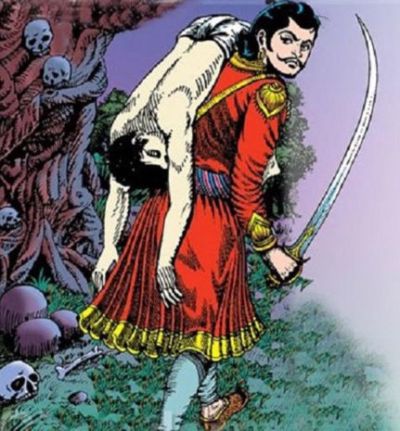Read the previous part here…
Now I have a question for you. Which of the four youth deserved to be the husband of princess Anaṅgarati? Who would be the best choice? Remember, if you know the answer, and don’t tell me the truth, your head will burst into a hundred pieces!

एतच् छ्रुत्वा स राजा तं वेतालं प्रत्यभाषत ।
मौनं त्याजयति प्रायः कालक्षेपाय मां भवान् ॥ १२,१६.३४ ॥
अन्यथा गहनः को ऽयं प्रश्नो योगेश्वरोच्यताम् ।
शूद्राय हि कुविन्दाय क्षत्रिया दीयते कथम् ॥ १२,१६.३५ ॥
वैश्यायापि कथं देया क्षत्रिया यच् च तद् गतम् ।
मृगादिभाषाविज्ञानं कार्ये तत् क्वोपयुज्यते ॥ १२,१६.३६ ॥
यो ऽपि विप्रस् तृतीयो ऽत्र तेनापि पतितेन किम् ।
स्वकर्मप्रच्युतेनेन्द्रजालिना वीरमानिना ॥ १२,१६.३७ ॥
तस्मात् तस्मै क्षत्रियाय चतुर्थाय समाय सा ।
देया खड्गधरायैव स्वविद्यावीर्यशालिने ॥ १२,१६.३८ ॥
एतत् तस्य वचो निशम्य नृपतेर् अंसस्थलात् पूर्ववत्
वेतालः स जगाम योगबलतः स्वस्थानम् एवाशु तत् ।
भूपालो ऽपि स तं तथैव पुनर् अप्य् आनेतुम् अन्वग् ययौ
उत्साहैकघने हि वीरहृदये नाप्नोति खेदो ऽन्तरम् ॥ १२,१६.३९ ॥
King Vikram replied…
“You are making me break my silence time and again, but why do you do it if you want me to answer such absurd questions? How can a princess, one who is born in royalty, be given in marriage to a weaver – what would they have in common?”
“Bhāṣājña knew the language of the birds and animals – of what practical use is it? How would the couple survive based on that one talent that he had?”
“And the Brahmin was a sorcerer – his caste is meant to guide humanity, to impart education and knowledge, not to engage in such dangerous pastimes. He too would not have anything in common with the princess.”
“But Khaḍgadhara was a Kṣatriya. He was of the same caste as Anaṅgarati, and of the same social background. He was distinguished for his bravery and skills in combat – these are skills that come in use when defending a kingdom. He alone would be able to provide a safe environment for the princess, and also one that she had been used to since childhood.”
“And so, Anaṅgarati should be given in marriage to Khaḍgadhara the Kṣatriya.”
As the king uttered these words, the Vetāla flew off his shoulder, laughing. And King Vikram once more started to walk towards the banyan tree, determined to fetch him.
दशमो वतेालः
The tenth story
Madanasenā and her promises
स त्रिविक्रमसेनो ऽथ गत्वा तं शिंशपातरोः ।
राजा जग्राह वेतालं पुनर् अंसे चचाल च ॥ १२,१७.१ ॥
प्रयान्तं च तम् आह स्म वेतालः सो ऽंसपृष्ठगः ।
श्रान्तो ऽसि राजंस् तद् इमां शृणु श्रमहरां कथाम् ॥ १२,१७.२ ॥
King Vikram brought down the Vetāla once again, put him across his shoulder, and started to walk back towards his destination.
The Vetāla spoke to him and said “You must be tired, o king. So here is a story that can help entertain you.”
अभूत् सकलभूपालमस्तकन्यस्तशासनः ।
वीरबाहुर् इति ख्यातो नाम्ना पार्थिवसत्तमः ॥ १२,१७.३ ॥
तस्यानङ्गपुरं नाम बभूव नगरोत्तमम् ।
तत्रासीद् अर्थदत्ताख्यः सार्थवाहो महाधनः ॥ १२,१७.४ ॥
तस्यासीद् धनदत्ताख्यज्येष्ठपुत्रकनीयसी ।
सुता मदनसेनेति कन्यारत्नं वणिक्पतेः ॥ १२,१७.५ ॥
ताम् एकदा निजोद्याने क्रीडन्तीं ससखीजनाम् ।
ददर्श धर्मदत्ताख्यो भ्रातृमित्रं वणिक्सुतः ॥ १२,१७.६ ॥
स ताम् आलोक्य लावण्यरसनिर्भरनिर्झराम् ।
आलक्ष्य कुचकुम्भाग्रां वलित्रयतरङ्गिताम् ॥ १२,१७.७ ॥
यौवनद्विरदस्येव क्रीडामज्जनवापिकाम् ।
सद्यो ऽभूत् स्मरबाणौघसंतापहृतचेतनः ॥ १२,१७.८ ॥
अहो धाराधिरूढेन रूपेण द्योतितामुना ।
इयं मे मानसं भेत्तुं भल्ली मारेण निर्मिता ॥ १२,१७.९ ॥
इत्य् आदि यावद् ध्यायन् स निर्वर्णयति तां चिरम् ।
तावत् तस्यातिचक्राम चक्राह्वस्येव वासरः ॥ १२,१७.१० ॥
ततो मदनसेना सा विवेश स्वगृहान्तरम् ।
चित्तं च धर्मदत्तस्य तदनालोकनव्यथा ॥ १२,१७.११ ॥
तददर्शनदुःखाग्निसंतापेनेव च ज्वलन् ।
लोहितो निपपाताशु भास्वान् अप्य् अपराम्बुधौ ॥ १२,१७.१२ ॥
तां विज्ञायैव सुमुखीं नक्तम् अभ्यन्तरे गताम् ।
उदियाय शनैश् चन्द्रस् तन्मुखाब्जविनिर्जितः ॥ १२,१७.१३ ॥
Long ago, there lived a fair and just king named Vīrabāhu. He was considered the emperor of Bhāratvarsha, and the kings of all the janapadas respected and feared him.
Vīrabāhu lived the capital city of Anaṅgapura. In this same city lived a rich merchant named Arthadatta. He had a son named Dhanadatta, and a beautiful daughter named Madanasenā.
One day, as Madanasenā was playing in her garden, with her friends and companions, a young merchant named Dharmadatta spotted her and instantly fell in love. There she was, her beauty in full blossom, with voluptuous breasts and beautiful curved hips, and she resembled a lake where the elephant of youth yearned to sport with abandon.
Dharmadatta was stuck by Kāmadeva, and he thought to himself “This beautiful flower has been made by the Deva of prema (love) himself, only to strike me right through my heart…”
And so the love-stricken Dharmadatta watched her all day, pining for her, only to realize that the whole day had passed and it was already evening. Madanasenā went back into her house, and Dharmadatta’s heart exploded with grief.
Even the evening sun sank slowly into the horizon, red, as if inflamed by the sinking passions in the young merchant’s heart. And the moon, that was easily surpassed by her beauty, rose slowly upwards, comforted that she had retired for the night.
Dharmadatta went home and lay on his bed, tossing and turning in the moonlight, which he thought was a poor substitute for the beauty of the maiden that he had witnessed earlier.
The next day…
to be continued…
